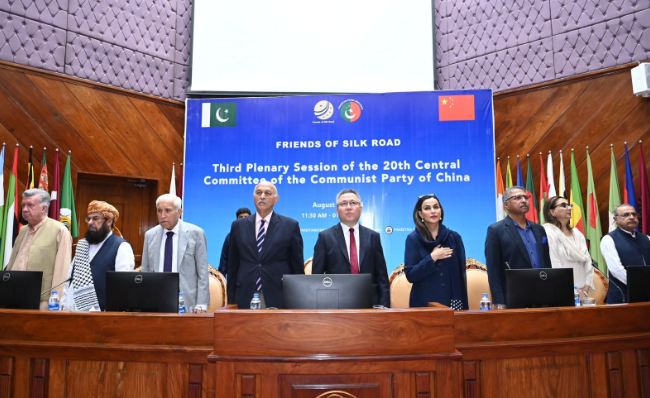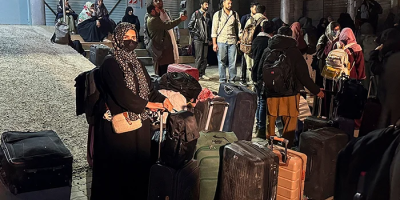Pakistan-China Institute unites 8 political parties in support of CPEC

Pakistan-China Institute’s All Parties Moot reaffirms unwavering support to CPEC, Mushahid terms ties with China central to Pakistan’s Future
ISLAMABAD, AUG 28 /DNA/ – Pakistan-China Institute (PCI), headed by Senator Mushahid Hussain Sayed, successfully organised a unique event under its ‘Friends of Silk Road’ series, which brought together leaders of 8 political parties on one platform to reaffirm support for CPEC. Leaders belonging to parties from Government and Opposition, PML-N, PPP, PTI, MQM, BAP, NP, NDM and JUI-F, from all provinces, were represented. They also discussed the results of the recently-concluded 3rd Plenum of the Communist Party of China (CPC) and its impact on China and its foreign relations.
Senator Mushahid Hussain Sayed , Chairman Pakistan-China Institute, emphasised the pivotal role of the CPC in China’s ongoing journey of reform and modernization, adding CPC is the world’s biggest political party with 100 million members and longest-serving political party, which has transformed China. Citing figures of China’s phenomenal progress since the 1979 Reform & Opening Up, he said then China had per capita income of $ 157 while now it’s $ 12,000, then China’s GDP was $ 150 billion, now it’s $ 18 trillion. And Fortune 500 now counts China with 142, largest number of companies. Senator Mushahid Hussain listed 5 reasons for the China Success Story in such a short time: Quality of Leadership, Ability to do Course Correction, Continuity of Policy, Learning from others, and Peaceful Foreign Policy.
Senator Sherry Rehman noted that the Third Plenary Session of the 20th Central Committee will have far-reaching impacts not only on China but also on the world. “China has played a crucial role in the development of the Global South, and the China-Pakistan Economic Corridor (CPEC) has created numerous investment opportunities in Pakistan,” Senator Rehman stated. She praised China’s Global Security Initiative, calling it a commendable effort that will ensure peace and stability globally. Additionally, she highlighted China’s role in clean energy development under CPEC as a significant contribution to sustainable development in Pakistan and the region.
Saadia Khaqan Abbasi commended China’s leadership in technological advancement, human development, and labor productivity. “The focus on security and development is a unique selling point of China”, she added.
Senator Shibli Faraz, Leader of Opposition, Pakistan Tehreek-e-Insaf (PTI) emphasised
China’s development story as a role model for the world and highlighted the Belt and Road Initiative (BRI) as having the potential for shared development and prosperity across the globe. “CPEC stands as a beacon of hope for Pakistanis, symbolizing the transformative impact of our strong bilateral relationship,” he added. Senator Faraz also congratulated the Pakistan-China Institute for hosting this important timely event and lauded the role of Senator Mushahid in promoting the enduring friendship between Pakistan and China.
Maulana Abdul Ghafoor Haideri, MNA, Jamiat Ulama-e-Islam underscored the enduring strength of Pakistan-China relations,
praising President Xi Jinping’s vital role in China’s development, noting that his leadership has been instrumental in driving China’s remarkable progress on the global stage.
Senator Afrasiab Khattak, Senior Leader of National Democratic Movement, (NDM), underlined that the Communist Party of China is more than just a political party; it is a popular ruling force that has steered China towards unprecedented development, adding ‘Pakistan must learn from China, do a course correction and become a frontline state in economic development, focusing on geoeconomics, rather than being a frontline state in conflicts’.
Senator Jan Muhammad Jamali said”The future of Balochistan is inextricably interconnected with Pakistan’s broader development goals and yesterday’s must not impede CPEC at any cost”.
Shezra Mansab Ali, MNA, Parliamentary Secretary, Ministry of Foreign Affairs,
reaffirmed Pakistan’s unwavering support for the One-China policy and respect for China’s unity, territorial integrity and sovereignty, adding that “China has consistently supported Pakistan on its core issues, including the Kashmir dispute.”
Senator Jan Muhammad Buledi, leader of National Party emphasized the importance of enhancing collaboration between Balochistan’s universities and their Chinese counterparts. “Our universities in Balochistan should strengthen ties with Chinese institutions to foster academic and research excellence,”
Senator Abdul Qadir from Balochistan Awami Party emphasized the wealth of knowledge and experience that Pakistan can gain from China’s successes across various sectors. “Pakistan can learn a great deal from China’s experience, especially in areas like economic development, infrastructure, and governance.”
Taha Ahmed Khan from MQM highlighted the strategic importance of Karachi as Pakistan’s trade hub, particularly due to its proximity to the China-Pakistan Economic Corridor (CPEC). “Karachi is not only the trade hub of Pakistan but also holds critical importance due to its close ties with the CPEC route,” Khan stated.
He also expressed the MQM’s strong condemnation of the recent attacks on Chinese nationals in Pakistan, reaffirming the party’s commitment to ensuring the safety and security of all Chinese citizens in the country. “We stand firmly against any attacks on our Chinese friends and partners,” he added.
Furthermore, Khan emphasized the importance of focusing on the Artificial Intelligence (AI) and Information Technology (IT) sectors under CPEC. “The AI and IT sectors are pivotal for Pakistan’s future, and we must prioritize their development within the framework of CPEC to fully realize the potential of this partnership,” he concluded.
Senator Ali Zafar from Pakistan Tehreek-e-Insaaf (PTI) emphasized the importance of the Communist Party of China’s (CPC) approach of policy continuity and its principle of “seeking truths from facts.” He noted that “The CPC’s continuity of policy and countering corruption are key factors in China’s sustained development, and Pakistan can benefit greatly from adopting a similar approach.”
Yang Nuo, Minister-Counsellor at the Chinese Embassy in Pakistan, emphasized the importance of the Third Plenary Session of the 20th Central Committee, describing it as a pivotal event for China’s future, stating “This session serves as a blueprint for further reforms in China, setting the stage for continued progress and development.”
Qaiser Ahmed Sheikh, Federal Minister for Maritime Affairs in his cosing remarks as Chief Guest shared his experiences from numerous visits to China, emphasizing the country’s consensus-oriented decision-making process. “In China, decisions are made through a consensus-driven approach, ensuring that all voices are heard and considered, which contributes to their effective governance,” Sheikh remarked. He also spoke about his visits to Gwadar, where he observed significant development under the China-Pakistan Economic Corridor (CPEC). “The development I witnessed in Gwadar is a clear indicator of the transformative impact CPEC has had on the region,” he said.
Sheikh further highlighted the potential and benefits of the Gwadar Airport, noting that it will play a crucial role in the region’s economic growth and connectivity. He concluded by reaffirming the strong bond between Pakistan and China, stating, “Pakistan and China are iron brothers, and we will continue to work together to achieve our shared goals.”
At the end of the event, Senator Mushahid Hussain Sayed read out a Joint Statement on behalf of all participating political parties. The statement reaffirmed Pakistan’s political parties commitment to deepening relationship with China, acclaiming the significant outcomes of the Third Plenary Session of CPC and their unshakable resolve to support, strengthen and sustain CPEC as this initiative is a guarantor for a better tomorrow for Pakistan.
The event was attended by over 200 participants from different sectors like academia, media, industry, civil society, students, scholars and think tanks.
Related News

Pakistan eliminates Mid-level TTP leaders in cross-border strikes as Operation Ghazab-lil-Haq intensifies
RAWALPINDI, MAR 5 /DNA/: Security sources on Thursday confirmed that several mid-level leaders of theRead More

Pakistanis fleeing Iran describe strikes shaking ground under their feet
ISLAMABAD, MAR 5 /DNA/: Pakistanis fleeing Iran described explosions and missile strikes across Tehran shakingRead More


Comments are Closed